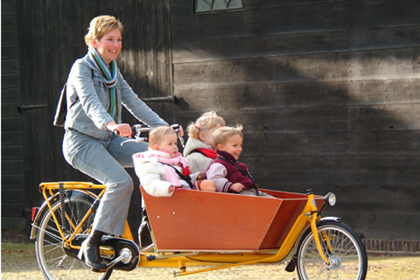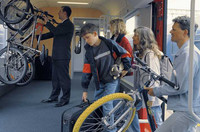
Sustainable Transport ~ Bicycle Transport
Bicycles have a critical role in moving toward sustainable transport.
The bicycle is an accessible, low cost, non-polluting and healthy mode of travel.
To improve our health, reduce greenhouse gas emissions and our dependence on transport fuel, the share of trips made by bicycle should be increased significantly through effective promotion, planning and infrastructure provision.
Greater use of bicycles would bring social, environmental and economic benefits including:

Healthier, safer community - Increased physical activity to raise fitness, reduce risk of disease and enhance mental well-being. Substituting car trips for bicycle trips will also reduce health impacts associated with pollution, such as respiratory disease. Bicycle use also enhances community safety through more 'eyes on the street' and fewer car trips.
Environment friendly transport - Minimal impact on the environment, while reducing emissions of air and water pollutants and greenhouse gases associated with car use.
Oil vulnerability - Bicycles use renewable energy and their greater use would reduce reliance on fossil fuels and so vulnerability to more costly, less secure oil supplies.
Equity and community - Bicycles offer a low cost, accessible mode of travel, for a range of trips and ages, that imposes minimal costs on household and public budgets. More people travelling by bicycle would help build community interaction and safety.
Efficiency - Bicycles use much less space and require less
infrastructure than motor vehicles. More travel on bicycles could
reduce traffic congestion and enhance the efficiency of the
transport system.
Transport and land use planning should promote increased bicycle use. For many years bicycles have been a marginalised mode in transport planning and urban design. Investment in bicycle transport is a 'no regrets' option that is justified on health, environmental and economic grounds and will enhance sustainability.
A proactive approach is needed to better meet the needs of bicycle users.
This demands a quantum improvement in planning and provision for bicycles in the transport system.
B2c_s1
Creating bicycle safe environments
To encourage greater bicycle use commuters and families need to lobby local planners and councils to provide a safe, friendly environment, an integrated, accessible network of paths and on-road routes that provides adequate space for bicycles.
Cairns is a linear
city on mostly level ground and is ideally suited for commuter trains
that allow people to take their bike on the train. Such a system has
the potential to drastically reduce rush hour congestion, reduce
poisonous fumes and make for a healthier lifestyle, as well as
significantly reducing greenhouse gas emissions.
The principle that 'every street is a bicycle street' should be embedded in road design and planning. Safety will also be improved through appropriate traffic regulations, speed limits and education. Priorities include:
Review and enforce road design standards and guidelines for roads and pathways to safely accommodate bicycles, including spatial requirements, route marking, bicycle-sensitive traffic signals and kerb ramps.
Require that professionals involved in road planning and engineering and traffic management undertake professional development in bicycle transport needs and standards.
Review the Road Traffic Code to more clearly and fairly define the rights of bicycle users including allowing people of all ages to ride on footpaths.
Proactively use the bicycle hazard reporting system to identify and rectify problem areas and facilities, and underlying design, construction and maintenance issues.
Give bicycles greater priority in planning and transport infrastructure
Bicycle transport should be recognised as a legitimate and preferred mode of travel. Land use planning should promote access by bicycles and investment in infrastructure for bicycle transport should be increased. This requires professional development, proactive planning policy, integrated and holistic planning practice and increased spending on bicycle transport. Priorities include:
D evelop
and implement a Statement of Planning Policy to promote bicycle
transport in local transport plans and road design and require all
local councils to develop a local Bike Plan.
evelop
and implement a Statement of Planning Policy to promote bicycle
transport in local transport plans and road design and require all
local councils to develop a local Bike Plan.
Require end-of-trip facilities for bicycle users in all local planning schemes and Australian Model Code on Residential Development, including appropriate provision for long and short-stay bicycle parking, lockers and showers in commercial development, office buildings and public institutions.
Improve integration of bicycle use and public transport by allowing carriage of bicycles on trains and buses, providing secure bike lockers at bus and train stations, designing stations to facilitate bicycle access to and through them and allowing bicycles in bus lanes.
Provide bicycle paths and bicycle lanes as part of any arterial road development or upgrade.
B2c_s2
Better represent bicycle transport interests in policy making

The voice of bicycle users and interests of bicycle transport should be better represented in policy-making forums. This is a basic requirement if bicycle transport is to have fairer consideration in planning and managing the transport network. Priorities to achieve this:
Ensure bicycle user interests are represented on the Road Safety Council through the road user representative/s and membership of taskforces.
Support bicycle user input to policy debates and advisory bodies by funding peak representative organisations and including them in transport policy forums.
establish a focal point for bicycle policy and programs in the state government, with adequate staff and funding to advocate bicycle use, engage stakeholders and deliver effective programs.
Promote bicycling as a preferred travel mode
 Community
awareness, access to good information and positive encouragement are
vital to greater bicycle use. Bicycle transport should be included
in the school curriculum and promoted by schools. Community based
promotions and provision of bicycle information should be continued.
Community
awareness, access to good information and positive encouragement are
vital to greater bicycle use. Bicycle transport should be included
in the school curriculum and promoted by schools. Community based
promotions and provision of bicycle information should be continued.
Make bicycle use and safety training more widely available and integrated into school programs, and increase support for the TravelSmart school program and Safe Routes to School initiative
Promote bicycle transport as an effective way to incorporate healthy physical activity into everyday life through health promotion campaigns and health advice
Make reliable, quality information on bicycle transport including equipment, routes and issues available to the public, including local area bicycle maps
P romote
bicycle use as a good travel mode through community, school and
workplace based demand management including the TravelSmart
household program.
romote
bicycle use as a good travel mode through community, school and
workplace based demand management including the TravelSmart
household program.
Electric assist bicycle
http://www.spinopsys.com/wp-
B2c_s3